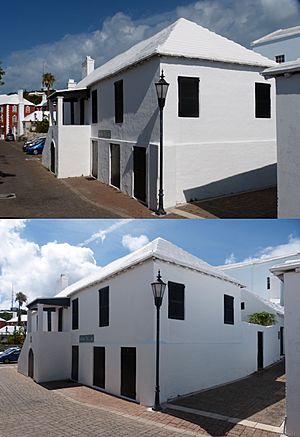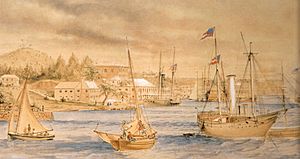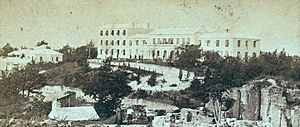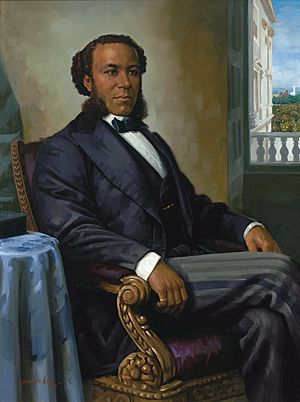Joseph Rainey facts for kids
Quick facts for kids
Joseph Hayne Rainey
|
|
|---|---|
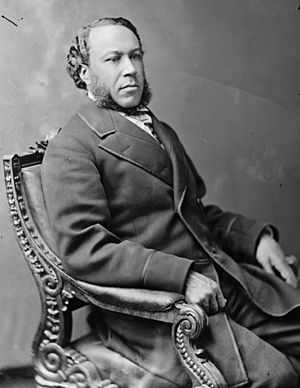 |
|
| Member of the U.S. House of Representatives from South Carolina's 1st district |
|
| In office December 12, 1870 – March 3, 1879 |
|
| Preceded by | Benjamin F. Whittemore |
| Succeeded by | John S. Richardson |
| Member of the South Carolina Senate from Georgetown County | |
| In office November 24, 1868 – November 28, 1870 |
|
| Preceded by | Richard Dozier |
| Succeeded by | John Francis Beckman |
| Personal details | |
| Born | June 21, 1832 Georgetown, South Carolina, U.S. |
| Died | August 1, 1887 (aged 55) Georgetown, South Carolina, U.S. |
| Nationality | American |
| Political party | Republican |
| Profession | Barber, politician, banker |
Joseph Hayne Rainey (June 21, 1832 – August 1, 1887) was an important American politician. He made history as the first black person to serve in the United States House of Representatives. He was also the second black person (after Hiram Revels) to serve in the United States Congress. During his time, he even led meetings in the House of Representatives.
Rainey was born into a family that worked hard. He became a member of the Republican Party.
Contents
Early Life and Freedom
Joseph Hayne Rainey was born in 1832 in Georgetown, South Carolina. His mother, Grace, had both Indigenous and French heritage. His father, Edward Rainey, was a barber. He was allowed to work for himself and built a successful business. He paid some of his earnings to his owner, as was required by law.
Edward saved enough money to buy his own freedom. He also bought the freedom of his wife and two sons, including Joseph. This happened in the 1840s. Because black people had very few chances for education, Joseph followed his father's path. He became a barber too. This job allowed him to be independent and respected in his community. It also helped him meet many different people.
Family Life
In 1859, Rainey traveled to Philadelphia, Pennsylvania. There, he met and married Susan. She was a free woman of color from the West Indies. She also had African-French roots. They moved back to South Carolina. Their three children, Joseph II, Herbert, and Olivia, were born there.
The Civil War Years
When the American Civil War started in 1861, Rainey was forced to work. Like other free black people, he was made to build defenses for the Confederates in Charleston, South Carolina. He also worked as a cook and helper on ships that tried to get past the Union's naval blockade.
In 1862, Rainey and his family escaped. They went to Bermuda, a British colony far off the coast. They settled in St. George's, Bermuda. Rainey worked as a barber there. His shop was in the cellar of the "Tucker House." His wife, Susan, became a successful dressmaker with her own shop.
In 1865, the family moved to Hamilton because of a yellow fever outbreak. Rainey worked at the Hamilton Hotel as a barber and bartender. Most of his customers were white. He and his wife earned a good living and became respected in Bermuda. Many black and white Bermudians also fought for the Union side in the U.S. Civil War.
Becoming a Leader: Politics After the War
After the U.S. Civil War ended, Rainey and his family returned to South Carolina in 1866. They settled in Charleston. Many people of color lived there, and many, like Rainey, had been free and had important jobs before the war. Rainey's experience and success helped him become a leader. He quickly got involved in politics. He joined the state Republican Party. In 1868, he helped write the state's new constitution.
In 1870, Rainey was elected to the South Carolina Senate. He quickly became the head of the Finance Committee. He served there only a short time. That same year, he won a special election to the 41st United States Congress. He was elected to fill a spot that became open.
Rainey took his seat on December 12, 1870. He was re-elected to Congress four times, serving until March 3, 1879. This was the longest time a black Congressman had served until the 1950s. He supported laws called the Enforcement Acts. These laws aimed to stop the violent actions of the Ku Klux Klan. These laws helped for a while. However, white groups later formed other violent groups in the South. These included the White League and the Red Shirts.
Rainey gave three speeches in Congress to support the Civil Rights Act of 1875. This law aimed to give black people equal rights. In 1873, he said he was not looking for "social equality." He meant he was happy to choose his own friends.
He explained his point:
But we do want a law enacted that we may be recognized like other men in the country. Why is it that colored members of Congress cannot enjoy the same immunities that are accorded to white members? Why cannot we stop at hotels here without meeting objection? Why cannot we go into restaurants without being insulted? We are here enacting laws for the country and casting votes upon important questions; we have been sent here by the suffrages of the people, and why cannot we enjoy the same benefits that are accorded to our white colleagues on this floor?
As violence against black people grew in the South, Rainey bought a "summer home" in Windsor, Connecticut in 1874. He moved his family there for their safety. He became an active member of the First Church of Windsor. The "Joseph H. Rainey House" is now a private home. It is part of the Connecticut Freedom Trail. This trail highlights the achievements of African Americans.
Rainey also worked to help the Southern economy. In May 1874, he became the first African American to lead a session of the House of Representatives. He was the Speaker pro tempore.
In 1876, Rainey won re-election. However, the election was full of problems. White Democratic groups like the Red Shirts used violence to stop black people from voting. For example, in July 1876, six black people were killed in the Hamburg massacre. In October, many more were killed in Ellenton.
Democrats took control of the state government that year. The next year, the federal government removed its troops from the South. This ended the period known as Reconstruction. In 1878, Rainey lost his re-election bid. White Democrats then passed laws for segregation (like Jim Crow) and made it harder for black people to vote. By 1895, a new state constitution took away the right to vote for most black people. This meant they had no political power for many decades.
Later Years and Legacy
After leaving Congress, Rainey worked for the U.S. Treasury Department in South Carolina for two years. Then, he started a career in business. He worked in banking in Washington, DC, for five years.
Rainey retired in 1886 and moved back to South Carolina. He got sick with malaria and died less than a year later, in August 1887. He was 55 years old and passed away in Georgetown, his hometown.
In 2018, a group called the Joseph Rainey Center for Public Policy was founded. It aims to help women, minorities, and new thinkers have a voice in public policy.
See also
 | George Robert Carruthers |
 | Patricia Bath |
 | Jan Ernst Matzeliger |
 | Alexander Miles |


